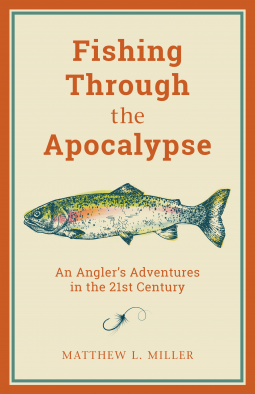
Fishing Through the Apocalypse
An Angler's Adventures in the 21st Century
by Matthew L. Miller
This title was previously available on NetGalley and is now archived.
Send NetGalley books directly to your Kindle or Kindle app
1
To read on a Kindle or Kindle app, please add kindle@netgalley.com as an approved email address to receive files in your Amazon account. Click here for step-by-step instructions.
2
Also find your Kindle email address within your Amazon account, and enter it here.
Pub Date Mar 01 2019 | Archive Date Mar 08 2019
Rowman & Littlefield | Lyons Press
Talking about this book? Use #FishingThroughTheApocalypse #NetGalley. More hashtag tips!
Description
What does the future hold for fish and the people who pursue them? Fishing Through the Apocalypse explores that question through a series of fishing stories about the reality of the sport in the 21st century. Matthew Miller (director of science communications for The Nature Conservancy) explores fishing that might be considered dystopian: joining anglers as they stick their lines into trash-filled urban canals, or visiting farm ponds where you can catch giant, endangered fish for a fee. But it isn’t all bleak. When it comes to fishing, the other part of the story is this: a cadre of anglers is looking to right past wrongs, to return native species, to remove dams, to appreciate the unappreciated fish, to clean our waters and protect public lands. As an angler and conservationist, Matt removes any and all preconceived notions about what it means to fish in the 21st century in order to see the different visions of the future that exist right here, right now. Fishing Through the Apocalypse offers one of the widest-ranging looks at fish conservation in the United States, and also includes some of the more unusual adventures ever featured in a fishing book. Features fishing adventures in:
Idaho
Colorado
Wyoming
New Mexico
Utah
Texas
Florida
Iowa
Minnesota
Illinois
Washington DC
Virginia
Pennsylvania
Matthew L. Miller is director of science communications for The Nature Conservancy, the world’s largest conservation organization. He is editor and lead writer the popular Cool Green Science blog and is one of the most prolific writers in the organization’s 65-year history. He has traveled across North America and to five continents to cover stories on science, nature and outdoor recreation. He’s worked for the Conservancy for 17 years, previously serving as communications director for the Idaho program. Matt received a degree in English – Creative Writing from Penn State, where he also worked as a publicity writer early in his career. As a freelance writer, he’s written about the outdoors for Sports Afield, Bugle, Quality Whitetails, Backcountry Journal, Living Bird and many other publications. He’s an active member of the Outdoor Writers Association of America, and has received numerous awards including Outstanding Board Member and several awards for blogging. He’s an avid angler, hunter, naturalist and distance runner, and lives in Boise with his wife and young son.
Available Editions
| EDITION | Hardcover |
| ISBN | 9781493037414 |
| PRICE | $24.95 (USD) |
Links
Featured Reviews
 Randal W, Reviewer
Randal W, Reviewer
Not your typical fishing book! Miller explores fishing in places most people have never tried, or even thought of. From catching fish in a garbage filled, toxic drainage ditch to fishing for salmon in Alaska, he tries it all. Golden trout, ciscos, suckers, gars, eels, sturgeon, every species you can imagine. Even exploring a type of fishing that I had never heard of, "microfishing", or fishing for tiny, tiny little minnow like fish.
I think that Miller's point is that, wherever there are fish, people will fish for them. And if it gets too expensive to fish for the well-known "trophy" species, or they become too rare, or places get too crowded, people will find another species. His quote from Chief Sitting Bull summed it up nicely, "When the buffalo are gone, we will hunt mice, for we are hunters and we want our freedom:".
This was a fun read, reminding me that the fun is in the act of fishing, rather than the pursuit of bigger or more fish.



